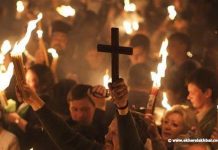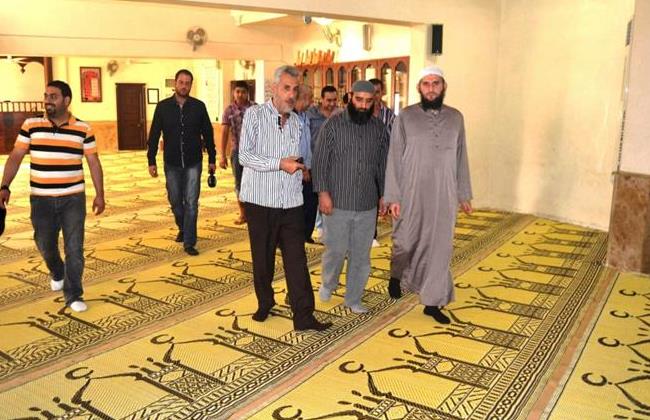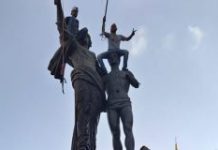Notorious extremists still in control of Tripoli mosque
Oct. 14, 2014
Misbah al-Ali| The Daily Star
TRIPOLI, Lebanon: An agreement by two notorious Islamist militants to evacuate their supporters from Tripoli’s Abdullah bin Masoud Mosque within 48 hours had not yet been honored Monday evening, casting doubt on a high-profile attempt by locals and security forces to enforce the law in the increasingly restive northern city. The road to the mosque, which is situated on Abdul Hamid Alley in the predominantly Sunni Bab al-Tabbaneh neighborhood, was still closed off late Monday, and the surveillance cameras around the building had not yet been removed either, despite their removal being a specific part of Sunday’s agreement with prominent local sheikhs.
The situation came about after it became apparent that Islamists Shadi Mawlawi and Osama Mansour – both of whom are believed to be affiliated to the Nusra Front – had turned the mosque into a base for their operations. They were supposed to hand control of it over to Dar al-Fatwa, the top Sunni Muslim institution, by Tuesday.
Local people are concerned that the presence of the militants posed a security risk to Tripoli that had to be dealt with.
However, a number of questions still hang over the deal.
The biggest issue is what would happen to Mawlawi and Mansour, both of whom have been sentenced to the death penalty in absentia for their involvement in a deadly bombing near an Army checkpoint in Tripoli in August.
After appearing for the meeting Sunday, they disappeared again. Although their exact whereabouts are unknown, both are believed to be in Lebanon, given that they have no means of traveling while there are warrants out for their arrest.
Mawlawi is rumored to be living in Bab al-Tabbaneh with plans to move to the Qobbah or Hamzah mosque. These rumors prompted Lebanese Army units to conduct a pre-emptive raid in the areas to prevent a repeat of the Abdullah bin Masoud Mosque situation.
On a Facebook page attributed to Mansour, a post appeared Monday saying: “We didn’t promise anyone. Stop believing the lies of the media. We will not leave [Bab] al-Tabbaneh because it’s our land. [We] fought those who fought with us. As for the mosque, it’s for praying only.”
The authenticity of the statement could not be verified, but some believe it is a sign that the agreement over Abdullah bin Masoud was never properly concluded.
According to a prominent figure in Tripoli, the pair are not as clearly aligned with the groups as some would have the public think.
“There’s no clear evidence linking between the [Abdullah bin Masoud] mosque’s group and the Nusra Front, regardless of whether Mawlawi or Mansour are vocal about their support for the Front,” said the source, who asked to remain anonymous.
“There’s also no clear evidence about the involvement of the [Mawlawi and Mansour] groups in attacking the Army checkpoints,” the source said. “On the contrary, there are people quoting Mawlawi denying these things [accusations].”
Mawlawi has claimed that his gang couldn’t have attacked the Army checkpoints because they were stuck in the mosque, which was being monitored by security members, according to the source.
But even if they can be removed from the scene, many fear that others of a similar ilk will merely take Mawlawi and Mansour’s place, hence the Army’s deployment in Bab al-Tabbaneh’s narrow alleys to prevent such a situation from happening.
This comes amid a general sentiment among the citizens of Tripoli that their city will continue to be at risk of a security deterioration even after this particular incident has been dealt with. It is not about eliminating pockets of problems, residents say, but rather about the government regaining its influence in and control of the city.
Lebanese Army commander Gen. Jean Kahwagi is clearly aware of this, as over the weekend he talked about the presence of secret cells in Tripoli and Akkar that aimed to connect the area with the Qalamoun and Qusair mountains in Syria. If successful, he said, this would give ISIS a vital path to the Mediterranean Sea.
The growing sway of jihadist groups in the north has become increasingly apparent, especially given the recent defection of three soldiers from the Lebanese Army to join their ranks.
Although these defections are not a massive setback for the Lebanese Army, they do create a general sense of instability in Akkar and Tripoli.
The dangers posed by these groups have also affected prominent sheikhs at Dar al-Fatwa.
Sheikh Hassan Merheb, general inspector at the institution, revealed that he had received threats from groups affiliated with ISIS, prompting him to leave his house and take precautionary measures.
“Around a month ago, a person came to the mosque where I preach. He was very keen on hearing my opinion about fighting in Syria,” Merheb said.
According to Merheb, he told this person that the fighting in Syria was wrong and couldn’t be considered as martyrdom in the service of God.
Then, two weeks ago, he received a message accusing him of backstabbing the jihadis and the newly established Islamic State.
“We’re not saying anything people don’t already know when we say extremist groups have a supportive environment in Tripoli,” Merheb said. “We shouldn’t let our youth and teenagers fall into their traps and follow the road of religious deviation.”
Merheb believes the threats against him are part of an ISIS plan to attack Dar al-Fatwa and eliminate its role in Lebanese society, as they are trying to do to the Lebanese Army.
He called for some 80 mosques – including Abdullah bin Masoud – not under Dar al-Fatwa’s remit to be brought under their supervision, “as long as they are places where youth get their ideas and convictions about Islam from.”
“It’s from here that combatting radicalism begins.”
Home LCCC English Daily Detailed News Bulletins Notorious extremists still in control of Tripoli mosque


















